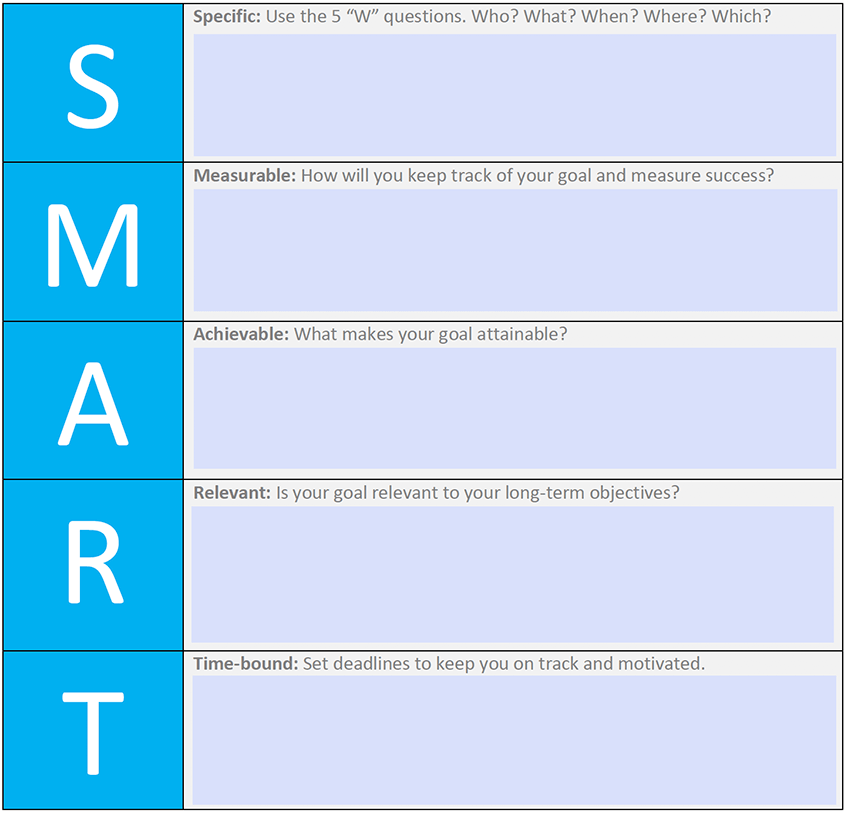Without setting yourself clear goals personally, or professionally, you can become entangled in a mess with no clear way out. This can leave you in a stressful situation in the workplace with work tasks piling up. Or it can leave you wondering why you are not achieving as much as your peers.
But how do you set yourself clear goals?
Thankfully there is a widely used concept that will help. You can use a simple template that allows you to set out all of the goals you need to progress. This concept is called SMART goals.
SMART goals definition
SMART is an acronym used for setting and defining clear goals. The concept can be adapted and used in various ways but essentially SMART stands for Specific, Measurable, Achievable, Relevant and Time bound.
What are SMART goals
Each of the 5 SMART elements contributes to setting out your goals. These goals might be personal or professional aims. Let’s take a look at them in more detail:
Specific
Vague goals and objectives will only give you indecisive results. It’s very important to start with clearly defined goals with details on how to achieve them. Specific aims can be set using the “W” questions:
- Who? – you need to consider who exactly will be involved in achieving this goal. Particularly in a working environment, it’s highly likely you will be working in a team or will at least require input from another team member at some stage. List your own and others potential contributions.
- What? – Down to the smallest detail, look at what exactly the goal is and what it involves.
- When? – Set a deadline for your goals. You cover this in more detail later when looking at Time Bound but it’s a good idea to set an overall deadline at this stage.
- Where? – Location. Maybe not always applicable but will you be working in a physical location or online? Or maybe a mixture?
- Which? – This can be requirements, obstacles, resources or limits. Which factors will help or perhaps hinder your progress.
- Why – The reason you are setting the goal. Career development? To improve the company? To improve yourself?
Measurable
Your goals, no matter what they are, will have to be measurable in some way. This might be a specific number, date or financial amount. Measurable goals give you something to aim for and can keep you motivated. This will also help you keep track of your progress. Ultimately it will give you a sense of achievement when you have reached your goals.
Achievable
There is nothing wrong with setting tough goals but they should also be achievable. Make sure your goals have a realistic time frame and that your measurable target is a number that is attainable. Look back on your specifics and make sure everything is within your capabilities.
Relevant
Your goals should really mean something to you. Working towards these goals should keep you motivated knowing that when they are achieved they serve a relevant purpose. Often we look at peers and try to copy their goals. But their goals might not fit in with your long term strategy. Your goals should always be relevant to your career or personal progression.
Time-bound
Without a time frame it will be difficult to achieve a goal. Setting a deadline for your goals will help keep you on track and keep you motivated. You can break your goals up into time bound segments. Setting mini targets could make it easier to achieve your goals.
How to write SMART goals
Setting SMART goals can be done using a simple template like the one we have created below. Based on the guidelines we have already covered above, fill in each of the five sections with details of your goal.

Download our template for SMART Goals and give it a try.
SMART Goals examples
SMART Goals example for marketers
Goal: Increase website traffic
Specific: I want to increase traffic to my website by optimizing my content using SEO techniques. The content I want to improve is my blog. I want to optimize my 5 most recent posts using a relevant keyword for each one. Keywords will have to be identified using the Google Keyword planner tool. Traffic will be measured using Google Analytics.
Measurable: 10% increase in traffic.
Achievable: I have optimized one of my blog posts using SEO techniques previously and this post achieved a 2% traffic increase in one month.
Relevant: Using keywords and SEO will increase website traffic. Subsequently, increased website traffic will generate sales for businesses.
Time-bound: I will optimize one post every 6 days. This equals one month. And a further month to see an increase of 10% traffic for the website.
SMART goals example for students
Goal: To achieve a higher grade in my next maths test
Specific: I only received 50% for my last maths test and I need 70% to pass next time. The test is in 2 weeks. Study time will have to increase and I will have to ask my teacher for advice on any areas I am struggling with. I will also do online research.
Measurable: I need an increase of 20% over my previous result in order to pass the test.
Achievable: I will increase my study time for maths from 1 hour to 2 hours per day. I will ask my teacher for advice on any areas I am struggling with.
Relevant: I need to pass this test to get an overall pass for maths for the year.
Time-bound: The test is in 2 weeks. I will study 2 hours every day for 2 weeks.
Should you use SMART Goals?
Setting ourselves personal and professional goals is a common behaviour for all of us. But more often than not we don’t realise these goals. The main reason for this is a lack of planning. We set ourselves unrealistic goals all the time. Without planning they are nothing but dreams.
Establishing your goals using the SMART method will improve your chances of reaching these targets considerably. Also, making goals that are specific, measurable, achievable, relevant and time-bound will ensure that you set a clear path for your future.




